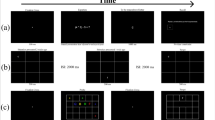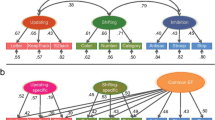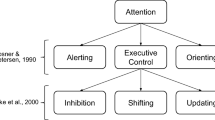Abstract
Affect can directly influence memory storage and retrieval, which offers the opportunity to improve memory performance by changing affective responses. A promising target is the left dorsolateral prefrontal cortex (dlPFC), as it is functionally involved in both affect and memory. This study explores whether anodal transcranial direct current stimulation (tDCS) to the left dlPFC improves memory retrieval through the reduction of negative affect and if this interacts with age. We randomly assigned 94 healthy individuals (n = 43 young, n = 51 elderly) to either sham or active tDCS during encoding of a verbal episodic memory task. Participants completed two questionnaires assessing affective states pre- and post-stimulation. They had to recall items unexpectedly 20 min after encoding and to name which feelings were associated with this free recall. We applied mediation models to explore the relation between tDCS, change in affect, and memory retrieval. In young participants, the reduction of negative affect via anodal tDCS fully mediated the increase in memory retrieval (R2 = 57%; p < 0.001); that is, a stronger reduction of negative affect via tDCS led to better memory performance. We did not observe these effects in the elderly. Our study provides a further link between affect and memory: as increased activity in the dlPFC is crucial for successfully coping with affective interference, anodal tDCS seems to help preventing irrelevant negative thoughts, thus foster attention allocation. Studies applying anodal tDCS to the left dlPFC in healthy young participants should consider changes in affect when interpreting the effect of stimulation on memory performance.




Similar content being viewed by others
References
Beck AT, Steer RA, Brown GK (1996) BDI-II, Beck depression inventory: manual. Psychological Corp., Harcourt Brace, San Antonio, Boston
Brosch T, Scherer K, Grandjean D, Sander D (2013) The impact of emotion on perception, attention, memory, and decision-making. Swiss Med Wkly. https://doi.org/10.4414/smw.2013.13786
Brunoni AR, Amadera J, Berbel B, Volz MS, Rizzerio BG, Fregni F (2011) A systematic review on reporting and assessment of adverse effects associated with transcranial direct current stimulation. Int J Neuropsychopharmacol 14:1133–1145. https://doi.org/10.1017/S1461145710001690
Brunoni AR, Schestatsky P, Lotufo PA et al (2014) Comparison of blinding effectiveness between sham tDCS and placebo sertraline in a 6-week major depression randomized clinical trial. Clin Neurophysiol Off J Int Fed Clin Neurophysiol 125:298–305. https://doi.org/10.1016/j.clinph.2013.07.020
Cabeza R (2002) Hemispheric asymmetry reduction in older adults: the HAROLD model. Psychol Aging 17:85–100
Canli T, Desmond JE, Zhao Z et al (1998) Hemispheric asymmetry for emotional stimuli detected with fMRI. NeuroReport 9:3233–3239. https://doi.org/10.1097/00001756-199810050-00019
Crawford JR, Henry JD (2004) The positive and negative affect schedule (PANAS): construct validity, measurement properties and normative data in a large non-clinical sample. Br J Clin Psychol 43:245–265. https://doi.org/10.1348/0144665031752934
Davis SW, Dennis NA, Daselaar SM et al (2008) Que PASA? The posterior-anterior shift in aging. Cereb Cortex 18:1201–1209. https://doi.org/10.1093/cercor/bhm155
Ellis HC, Seibert PS, Varner LJ (1995) Emotion and memory: effect of mood states on immediate and unexpected delayed recall. J Soc Behav Personal 10:349–362
Elmer S, Burkard M, Renz B et al (2009) Direct current induced short-term modulation of the left dorsolateral prefrontal cortex while learning auditory presented nouns. Behav Brain Funct BBF 5:29. https://doi.org/10.1186/1744-9081-5-29
Fletcher P (1998a) The functional roles of prefrontal cortex in episodic memory. I. Encoding. Brain 121:1239–1248. https://doi.org/10.1093/brain/121.7.1239
Fletcher P (1998b) The functional roles of prefrontal cortex in episodic memory. II. Retrieval. Brain 121:1249–1256. https://doi.org/10.1093/brain/121.7.1249
Gandiga PC, Hummel FC, Cohen LG (2006) Transcranial DC stimulation (tDCS): a tool for double-blind sham-controlled clinical studies in brain stimulation. Clin Neurophysiol Off J Int Fed Clin Neurophysiol 117:845–850. https://doi.org/10.1016/j.clinph.2005.12.003
Grimm S, Beck J, Schuepbach D et al (2008) Imbalance between left and right dorsolateral prefrontal cortex in major depression is linked to negative emotional judgment: an fMRI study in severe major depressive disorder. Biol Psychiatry 63:369–376. https://doi.org/10.1016/j.biopsych.2007.05.033
Habib R, Nyberg L, Tulving E (2003) Hemispheric asymmetries of memory: the HERA model revisited. Trends Cogn Sci 7:241–245
Hayes AF (2013) Introduction to mediation, moderation, and conditional process analysis: a regression-based approach. The Guilford Press, New York
Heise K-F, Niehoff M, Feldheim J-F et al (2014) Differential behavioral and physiological effects of anodal transcranial direct current stimulation in healthy adults of younger and older age. Front Aging Neurosci 6:146. https://doi.org/10.3389/fnagi.2014.00146
Herold C (2008) Die Verarbeitung emotionaler Konnotation: eine EEG Studie. https://kops.uni-konstanz.de/handle/123456789/10721
Herwig U, Satrapi P, Schönfeldt-Lecuona C (2003) Using the international 10–20 EEG system for positioning of transcranial magnetic stimulation. Brain Topogr 16:95–99
Javadi AH, Walsh V (2012) Transcranial direct current stimulation (tDCS) of the left dorsolateral prefrontal cortex modulates declarative memory. Brain Stimul 5:231–241. https://doi.org/10.1016/j.brs.2011.06.007
Kensinger EA (2009) Remembering the details: effects of emotion. Emot Rev 1:99–113. https://doi.org/10.1177/1754073908100432
Leach RC, McCurdy MP, Trumbo MC et al (2018) Differential age effects of transcranial direct current stimulation on associative memory. J Gerontol B Psychol Sci Soc Sci. https://doi.org/10.1093/geronb/gby003
Lee GP, Meador KJ, Loring DW et al (2004) Neural substrates of emotion as revealed by functional magnetic resonance imaging. Cogn Behav Neurol Off J Soc Behav Cogn Neurol 17:9–17
Manenti R, Brambilla M, Petesi M et al (2013) Enhancing verbal episodic memory in older and young subjects after non-invasive brain stimulation. Front Aging Neurosci 5:49. https://doi.org/10.3389/fnagi.2013.00049
Martin AK, Meinzer M, Lindenberg R et al (2017) Effects of transcranial direct current stimulation on neural networks in young and older adults. J Cogn Neurosci 29:1817–1828. https://doi.org/10.1162/jocn_a_01166
Mondino M, Thiffault F, Fecteau S (2015) Does non-invasive brain stimulation applied over the dorsolateral prefrontal cortex non-specifically influence mood and emotional processing in healthy individuals? Front Cell Neurosci. https://doi.org/10.3389/fncel.2015.00399
Morgan HM, Davis NJ, Bracewell RM (2014) Does transcranial direct current stimulation to prefrontal cortex affect mood and emotional memory retrieval in healthy individuals? PLoS One 9:e92162. https://doi.org/10.1371/journal.pone.0092162
Mosayebi MS, Agboada D, Jamil A et al (2018) Nonlinear effects of transcranial direct current stimulation over the primary motor cortex with different stimulation intensity and duration. Front Neurosci. https://doi.org/10.3389/conf.fnins.2018.95.00012
Nasreddine ZS, Phillips NA, Bédirian V et al (2005) The Montreal Cognitive Assessment, MoCA: a brief screening tool for mild cognitive impairment. J Am Geriatr Soc 53:695–699. https://doi.org/10.1111/j.1532-5415.2005.53221.x
Nikolin S, Loo CK, Bai S et al (2015) Focalised stimulation using high definition transcranial direct current stimulation (HD-tDCS) to investigate declarative verbal learning and memory functioning. NeuroImage 117:11–19. https://doi.org/10.1016/j.neuroimage.2015.05.019
Nitsche MA, Paulus W (2000) Excitability changes induced in the human motor cortex by weak transcranial direct current stimulation. J Physiol (Lond) 527 Pt 3:633–639
Nyberg L (2017) Functional brain imaging of episodic memory decline in ageing. J Intern Med 281:65–74. https://doi.org/10.1111/joim.12533
O’Connell NE, Cossar J, Marston L et al (2012) Rethinking clinical trials of transcranial direct current stimulation: participant and assessor blinding is inadequate at intensities of 2 mA. PLoS One 7:e47514. https://doi.org/10.1371/journal.pone.0047514
Ochsner KN, Silvers JA, Buhle JT (2012) Functional imaging studies of emotion regulation: a synthetic review and evolving model of the cognitive control of emotion. Ann NY Acad Sci 1251:E1–E24. https://doi.org/10.1111/j.1749-6632.2012.06751.x
Paller KA, Wagner AD (2002) Observing the transformation of experience into memory. Trends Cogn Sci 6:93–102
Perceval G, Flöel A, Meinzer M (2016) Can transcranial direct current stimulation counteract age-associated functional impairment? Neurosci Biobehav Rev 65:157–172. https://doi.org/10.1016/j.neubiorev.2016.03.028
Phelps EA (2004) Human emotion and memory: interactions of the amygdala and hippocampal complex. Curr Opin Neurobiol 14:198–202. https://doi.org/10.1016/j.conb.2004.03.015
Plazier M, Joos K, Vanneste S et al (2012) Bifrontal and bioccipital transcranial direct current stimulation (tDCS) does not induce mood changes in healthy volunteers: a placebo controlled study. Brain Stimul 5:454–461. https://doi.org/10.1016/j.brs.2011.07.005
Plewnia C, Schroeder PA, Kunze R et al (2015) Keep calm and carry on: improved frustration tolerance and processing speed by transcranial direct current stimulation (tDCS). PLoS One 10:e0122578. https://doi.org/10.1371/journal.pone.0122578
Poreisz C, Boros K, Antal A, Paulus W (2007) Safety aspects of transcranial direct current stimulation concerning healthy subjects and patients. Brain Res Bull 72:208–214. https://doi.org/10.1016/j.brainresbull.2007.01.004
Rey A (1941) L’examen psychologique dans les cas d’encéphalopathie traumatique. (Les problems.). [The psychological examination in cases of traumatic encepholopathy. Problems.]. Archives de Psychologie 28:215–285
Ruf SP, Fallgatter AJ, Plewnia C (2017) Augmentation of working memory training by transcranial direct current stimulation (tDCS). Sci Rep 7:876. https://doi.org/10.1038/s41598-017-01055-1
Sandrini M, Brambilla M, Manenti R et al (2014) Noninvasive stimulation of prefrontal cortex strengthens existing episodic memories and reduces forgetting in the elderly. Front Aging Neurosci 6:289. https://doi.org/10.3389/fnagi.2014.00289
Smirni D, Turriziani P, Mangano GR et al (2015) Modulating memory performance in healthy subjects with transcranial direct current stimulation over the right dorsolateral prefrontal cortex. PLoS One 10:e0144838. https://doi.org/10.1371/journal.pone.0144838
Tulving E (2002) Episodic memory: from mind to brain. Annu Rev Psychol 53:1–25. https://doi.org/10.1146/annurev.psych.53.100901.135114
Tulving E, Kapur S, Craik FI et al (1994) Hemispheric encoding/retrieval asymmetry in episodic memory: positron emission tomography findings. Proc Natl Acad Sci USA 91:2016–2020
Vaseghi B, Zoghi M, Jaberzadeh S (2014) Does anodal transcranial direct current stimulation modulate sensory perception and pain? A meta-analysis study. Clin Neurophysiol Off J Int Fed Clin Neurophysiol 125:1847–1858. https://doi.org/10.1016/j.clinph.2014.01.020
Voss JL, Lucas HD, Paller KA (2012) More than a feeling: pervasive influences of memory without awareness of retrieval. Cogn Neurosci 3:193–207. https://doi.org/10.1080/17588928.2012.674935
Wager TD, Phan KL, Liberzon I, Taylor SF (2003) Valence, gender, and lateralization of functional brain anatomy in emotion: a meta-analysis of findings from neuroimaging. NeuroImage 19:513–531
Wallace D, Cooper NR, Paulmann S et al (2016) Perceived comfort and blinding efficacy in randomised sham-controlled transcranial direct current stimulation (tDCS) trials at 2 mA in young and older healthy adults. PLoS One 11:e0149703. https://doi.org/10.1371/journal.pone.0149703
Watson D, Clark LA, Tellegen A (1988) Development and validation of brief measures of positive and negative affect: the PANAS scales. J Pers Soc Psychol 54:1063–1070
Woods S, Delis D, Scott J et al (2006) The California Verbal Learning Test—second edition: test-retest reliability, practice effects, and reliable change indices for the standard and alternate forms. Arch Clin Neuropsychol 21:413–420. https://doi.org/10.1016/j.acn.2006.06.002
Yesavage JA, Sheikh JI (1986) 9/Geriatric depression scale (GDS). Clin Gerontol 5:165–173. https://doi.org/10.1300/J018v05n01_09
Zwissler B, Sperber C, Aigeldinger S et al (2014) Shaping memory accuracy by left prefrontal transcranial direct current stimulation. J Neurosci 34:4022–4026. https://doi.org/10.1523/JNEUROSCI.5407-13.2014
Author information
Authors and Affiliations
Corresponding author
Ethics declarations
Conflict of interest
The authors declare that there are no conflicts of interest
Ethical approval
The Ethics Commission (University of Freiburg, Germany) approved the study and all experiments were conducted according to the Declaration of Helsinki.
Informed consent
All participants gave written informed consent prior to testing and received financial compensation.
Additional information
Publisher's Note
Springer Nature remains neutral with regard to jurisdictional claims in published maps and institutional affiliations.
Rights and permissions
About this article
Cite this article
Peter, J., Neumann-Dunayevska, E., Geugelin, F. et al. Reducing negative affect with anodal transcranial direct current stimulation increases memory performance in young—but not in elderly—individuals. Brain Struct Funct 224, 2973–2982 (2019). https://doi.org/10.1007/s00429-019-01946-1
Received:
Accepted:
Published:
Issue Date:
DOI: https://doi.org/10.1007/s00429-019-01946-1




